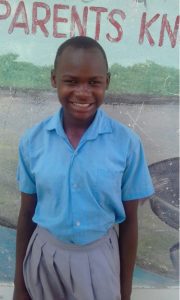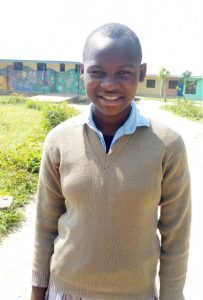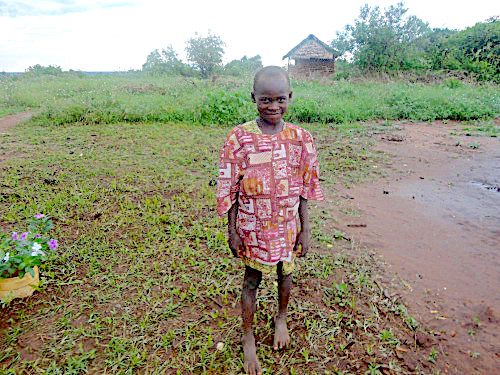Finding Fulfillment After Homelessness, Hunger, and Isolation
by Lauren Blair
Posted on January 7, 2022
Beliefs, Child, disability, education, Health, International, marginalized, stigma, vulnerable

Riziki in her school uniform
Before receiving assistance from Kupenda, Riziki was treated poorly by her family and community. Similar to her grandmother, Riziki was born deaf. Since her family did not know sign language, communication was challenging, and life was very isolating. Her parents did not believe that someone with a hearing impairment was capable or worthy of learning and attending school. Although they tried taking her to a traditional healer for assistance, her condition remained unchanged.
Additionally, Riziki’s health began to deteriorate due to a lack of food and housing. With the onset of floods in the area, the mud hut she lived in with her four siblings was destroyed, and her family was displaced. By the time they were able to reestablish their farm, the area experienced a lengthy drought. Her hunger, lack of housing security, and inability to communicate with others or receive an education left her feeling physically weak and hopeless.
Fortunately, Kupenda learned of Riziki’s situation and our Kenyan field staff connected her to American sponsors who helped her access medical care, education, and family counseling. Kupenda also helped Riziki by connecting her with doctors and helping her access food and a hearing aide. Even when school was dismissed during the pandemic, Kupenda’s supported her through our Covid-19 food relief program.
In a recent interview with our team Riziki said,
“There is a positive change–I am healthy and strong because I get regular treatment when required and healthy meals.”

15-year-old Riziki in front of her school
Now that Kupenda has enrolled her in a local school, Riziki also has the benefit of a safe place to board and the ability to learn sign language, academic studies, and tools for future employment. Academically, she is performing above expectations and is competent in writing, reading, math, Christian religious education, and science. With the help of a hearing aide, she can also understand more of the classroom instruction. Socially, Riziki has gained many friends who are loving and accepting of her differences. She loves to spend time with them in her school’s wildlife club and when they compete together in volleyball.
Kupenda is also helping Riziki’s parents learn sign language and acquire legal documents, insurance papers, government and community resources, as well as the socio-emotional skills they need to accept, support, and advocate for Riziki going forward. Their growing ability to communicate, paired with the assistance they receive, has empowered them to champion the rights of their child and become more involved in her life.
Now that she is receiving an education, is physically stronger, and can communicate with others, Riziki has many more prospects for her future. She has become skilled in beadwork and is active in helping her family when she is at home. She also receives counseling from Kupenda about options for her academic and vocational future. When asked about her feelings, Riziki responded,
“I am more confident than I used to be because I have grown big and I am at school.”
Through all of these efforts, not only has Riziki’s life been improved, but so have those of the people around her. At her school, she is known for her kindness and social nature. She often assists the other children when they have a need. At home, Riziki’s influence on her family has transformed their attitudes to be more supportive of people with differences. Her life is an ongoing testament to what is possible for people with disabilities when they are given opportunities to thrive.
According to Riziki,
“In the early days [other people] were treating me badly, but nowadays they treat me with more love and kindness because they were taught about treating [children with disabilities] well.”
You can Sponsor a Child, like Riziki, for just $30 / month here!
And check out our Sponsorship Frequently Asked Questions here.
Want to keep updated on Kupenda’s work?
You can follow us on Facebook, Instagram, LinkedIn, and Twitter.
And please also sign up for our monthly newsletter and updates here.
You can also help children with disabilities stay safe and healthy during COVID-19 by donating here.




Leave a Reply